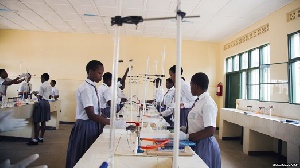A critical assessment shows that Ghana’s education system, more than 60 years after Independence, has largely not served its purpose of educating people to meet the challenges of today.
Instead, it has, by and large, become a manufacturer of graduates who are largely equipped for “clerical activities and occupations of foreign commercial and mercantile concerns”, a condition Ghana’s first President Dr Kwame Nkrumah bemoaned and fought tirelessly against. The reason, it seems to me, is the total neglect or minimal attention to STEM education.
STEM education is an approach to learning that integrates the Sciences, Technology, Engineering, and Mathematics. Through STEM education, students acquire critical and independent thinking skills, become creative and efficient problem solvers, and are empowered to succeed by adapting to current circumstances [1].
The promise of STEM education is assuring, like the US, China, and South Korea have shown, and the government should rethink the Science, Technology, and Innovation policy with a renewed focus on the “STEM-ification” of our education system.
We need a STEM-focused education because we’re lagging behind in economic growth and development relative to other countries with equal opportunities. Malaysia, for example, was comparatively similar to Ghana (in economic status) at the time of their independence (on Aug. 31, 1957) from the British. However, our current economic status is far from similar.
The World Bank attributed Malaysia’s success story to its ability to transform its agrarian (low skill, low tech) economy into a manufacturing hub that has become a “leading exporter of electrical appliances, electrical parts, and components”. This transformation stems from their National Science and Technology initiative in 1986 (and subsequent policies) to promote research and innovation.
Of course, we also have a success story. Our democratic principles such as freedom of speech and of the press, as well as an independent judiciary, have consistently been ranked among the top three in Africa. However, these successes are not at par with our “Asian twin”. Our unemployment rate is higher than the global unemployment rate, and most significantly, higher than our neighbours in the Sub-Saharan African region. Our economy is largely service sectored, partly agrarian (but still not technologically based), and a small industrial sector.
Implementing a STEM-focused education system will benefit our younger population and our country in general. Promoting STEM education will increase STEM graduates who will benefit from the opportunities created by the ever-growing STEM-related jobs, and will inadvertently grow our economy.
The Pew Research Centre (an American think tank), for example, found that those in STEM careers have higher-paying jobs compared to their counterparts in the liberal arts and humanities. More so, individuals in STEM careers are more likely to become entrepreneurs.
People in STEM careers are more likely to succeed (especially in Ghana) because our current problems (including, but not limited to, poor roads, housing deficiencies, crumbling bridges and other infrastructures, dilapidated healthcare system, and shortages of medical supplies) require their expertise. To address these issues, STEM careers, such as engineering, healthcare, architecture, and other scientists are desperately needed in our country.
In a recent article published in the Daily Graphic, Mr. Samuel Okudzato Ablakwa, the MP for North Tongu, on his vision for the New U.S. President, stated that the current political turmoil in the U.S. and the rise of Nationalism in the West should encourage us “to be self-reliant and self-sufficient” because we “cannot continue to be dependent on wealthy” nations to put out our kitchen fire if their houses are in flames.
And the current COVID-19 vaccine nationalism should be a wakeup call, because whereas pandemics (and the impending climate catastrophe) require global collaboration, individual countries have huge responsibilities to address their local problems with STEM-fuelled innovations.
For decades the U.S. has maintained the status as the world superpower through scientific and technological innovations. But the emphasis on Science and technology education has not always been a national priority. Things changed, however, after October 4, 1957, when Russia sent Sputnik 1 (the first-ever artificial orbiting satellite) to space. This incident gave the US a pause to think about their educational system, to reassess what was working and what had failed. The federal government, which hitherto was largely out of the education system, had an awakening and what happened afterward was historic: it led to the moon landing of July 20, 1969, and has culminated in the present-day Silicon Valley world dominance.
The launch of Sputnik 1 changed the US education system forever—with more federal involvement, more spending, and a huge emphasis on science education. It
led to the passage of a new education bill under the guise of a defence bill. The purpose, however, was to revamp science education. As a result of this federal intervention in education, enrolment in colleges and universities soared (especially, for low-income students in science and technology through government-subsidized loans), and curricula were upgraded to meet national demands.
While addressing the Legislative Assembly in 1957, Dr Nkrumah, laid out his vision for a new country with a lot of promises and challenges. But assured his fellow citizens that the challenges were not insurmountable if the education system is reinvented to “produce scientifically minded people”, through “a higher standard of technical education”.
This vision, he indicated, could be realized if we establish universities and research institutions for “agriculture, biology, and the physical and chemical sciences”. This initiative, he argued, will not only enhance our prospect as a country, but will also be a great service to Africa.
In an article 'Education and African Nationalism', when he was a student at the University of Pennsylvania, Dr Nkrumah contended that education should provide and enhance the “economic and technical progress of the people it purports to serve”, and that any educational system that doesn't provide these services “has completely failed in its purpose and has become a fraud”.
The purpose of education, especially for the youth of Africa, Dr Nkrumah concluded, was to prepare the African youth to “meet any definite situations of the changing community”, but not to train them for “clerical activities and occupations of foreign commercial and mercantile concerns”.
To conclude, unless we diversify our current economy “from the cocoa-gold-timber structure” to industrialized (through STEM-focused education) “higher productivity”[2], we cannot achieve the middle-status economy we hope for, in the foreseeable future.
(Kennedy Damoah, is a graduate student at Worcester Polytechnic Institute, USA. mdamoahkennedy@gmail.com)
Opinions of Saturday, 27 March 2021
Columnist: Kennedy Damoah















